- February 09, 2023
- By Chris Carroll
FATEMA HOSSEINI made her way to work in Kabul on Aug. 15, 2021, an unremarkable figure at first, but transformed hour by hour into a spectacle, and finally, a target.
Afghanistan’s president had fled the country and the U.S. Embassy was being evacuated, according to breaking news reports, and in a city where a full hijab was suddenly advisable, the then-27-year-old journalist’s loose headscarf now looked too perfunctory, her fashionable skirt ending well above the knee now shameful, despite the jeans worn underneath.
It was widely assumed that the tottering central government would collapse after U.S. forces’ withdrawal, scheduled for completion 20 years to the day after the terrorist attacks that had brought them here. The abruptness of it, while troops were still filtering out, had been a frightening jolt for everyone, even at Kabul Now, the investigative English-language news agency where Hosseini covered corruption, women’s rights and other controversial topics. Outside, Taliban fighters roamed the capital’s streets, unopposed, for the first time since 2001.
Her anxiety mixed with defiance. Wasn’t now the time for journalists to do their jobs? Worried for her safety, her mostly male colleagues urged her to get home and lie low. While none of them was safe, her in-your-face social media approach—typified by her use of Twitter tags like #TalibanGotoHell—made the diminutive, unmarried Hosseini a tempting object for retaliation. It could come via a bullet or, what scared her more, forced marriage to some Islamist insurgent turned de facto government soldier.
With a male colleague and his wife, she fled through streets that had assumed a zombie apocalypse vibe—cars colliding, pedestrians running in terror. A tan pickup, one of thousands abandoned in the U.S. retreat, rolled past them, loaded with Kalashnikov-wielding guerilla fighters.
The only woman outside in her neighborhood, she ignored the urge to run and instead strolled calmly home—a strange vision to men embracing the new reality. “Look at that bitch,” spat a shopkeeper who’d never before bothered her. “You’ll find out things have changed.”
At her flat, where her parents, teenage brother and adopted baby sister—recent evacuees from the Taliban’s takeover of the western Afghan city of Herat—were sheltering, her calm evaporated and she fell into her mother’s arms.
The next morning her mother forbade her to go to work. With a crushing headache, Hosseini lay for hours on the floor of the apartment thinking of her bleak future in Afghanistan, knowing she and her family had to escape—but how?
Hosseini recounts the start of that life-threatening journey from Kabul to Ukraine to the United States in a series of interviews in Knight Hall. Now a graduate student in the Philip Merrill College of Journalism, she isn’t just willingly relating the traumatic events of her final days in Afghanistan, but reliving them through frequent nightmares. Many nights, the world is again collapsing, and she is being chased, grabbed, beaten by pitiless men who despise every facet of her identity. “Getting out of Afghanistan, part of me died there,” she says. What survived is a drive for autonomy and freedom that has shaped her life.
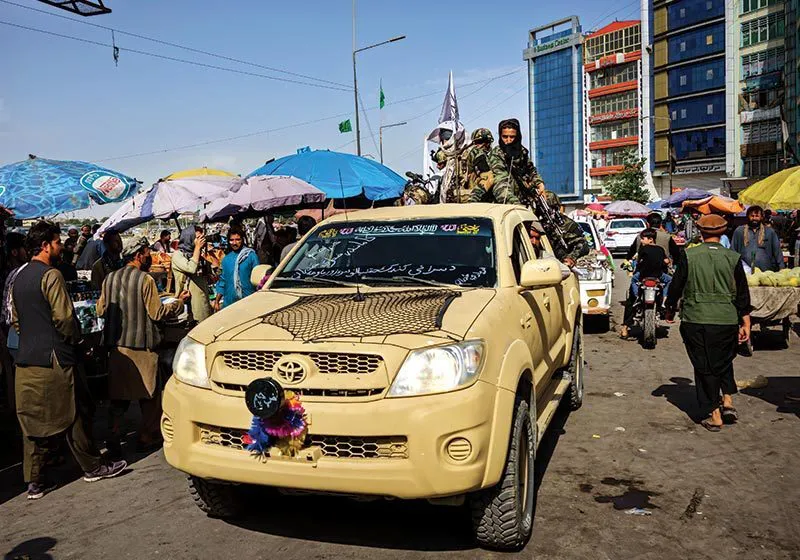
BORN A REFUGEE
Her story can start as far back as you please: the Sunni-Shia split in Islam 1,400 years ago; medieval migrations and clashes of cultures that created the patchwork of modern Afghanistan; two centuries of warfare and geopolitical wrangling by Britain, Russia and the United States; the rising threats of terrorism and religious fundamentalism.
Hosseini’s parents, Sayed and Masuma, had at least two political strikes against them. His father had served in Afghanistan’s Soviet-backed national army battling the Taliban’s predecessors, the U.S.-sponsored mujahideen. Secondly, they were members of the oft-persecuted Hazara minority, which makes up about 20% of the population and whose partially East Asian genetic background and adherence to the Shia branch of Islam differentiate them from most Afghans.
For safety, the family had fled to neighboring Iran with their older daughter, Marzia, during the Taliban’s first rise to power in the 1990s, culminating in an earlier sack of Kabul and the group’s embrace of Osama bin Laden and al-Qaida.
Fatema was born in 1994 in eastern Iran; across the border in Afghanistan, Taliban attacks on Hazara communities increasingly looked like genocide. Thousands were slaughtered in a single episode in Mazar-i-Sharif in 1998, along with countless smaller atrocities elsewhere. In 2001, United Nations observers uncovered Hazara mass graves in Bamiyan, the province the Hosseinis had fled. (The attacks continue, as seen in a suicide bombing at a Kabul school in October that killed 53 people, mostly Hazara girls and young women.)
Iran’s introduction of a measure that drove the cost of education out of reach for many refugees pushed the family back to Afghanistan in 2004. Thanks to the U.S.-led overthrow of the Taliban government and new international funding for girls’ education, 13-year-old Marzia and 10-year-old Fatema were free to learn in their homeland.
Masuma, who’d entered an arranged marriage with Sayed at 13 and had Marzia at 18, was determined that her own daughters would finish high school at least. When she approved a marriage proposal over her older daughter’s objections, the groom’s family (Masuma’s relatives—a common arrangement in Afghanistan) agreed to her request that the union would wait until the bride turned 18. Marzia’s real passion was English, and she soon opened a language school at home, earning a bit of money by passing along what she had learned to local children whose schools did not teach English.
Fatema, meanwhile, lived to shoot marbles with neighborhood boys. She was a talented student whose love of math and science competed with her fondness for goofing off in class, Marzia recalls.
Unfortunately for annoyed teachers who hoped to send her home for the day for coming unprepared, Fatema had likely already read the entire textbook and could answer every question with a smile, to classmates’ great amusement. “She’s always been bold and outspoken and so smart,” Marzia says.
GENDER WALLS AND DOORS
A few years after returning from Iran, Marzia Hosseini took an office job at the provincial governor’s office in Herat, supplementing her father’s income as a recently enlisted Afghan soldier. It allowed Fatema to enroll in a prestigious private high school in the city, but meant grueling commutes from an outlying suburb, a schedule that became still harder when she began daily, two-hour classes to prepare for college entrance exams.
One morning, she was robotically trudging to the bus after only a few hours of sleep when a man rushed at her on a dark, deserted street. He seized and groped her, pulling at her clothes. Exploding with screams and flying elbows, Hosseini broke free and sprinted for a main road. Her mother heard the commotion and came running to grab the man, who claimed before fleeing that a vicious dog had chased the girl.
Shaken and in tears, Fatema declared she was done leaving the house before dawn to make the two-hour journey to school. Masuma comforted her daughter, but told her if she quit, it would simply confirm to doubters among their neighbors and extended family that girls and education don’t mix.
She endured, suffering the psychological aftermath: “You want to peel your skin off so you can wash it.” She was ready for the next attack, too. When a man roughly fondled her through the thin fabric of the seat bottom on a bus bound for school, she spun and smacked him across the face. What would be a gutsy move on the D.C. Metro could have gone very badly in provincial Afghanistan. She avoided a potentially violent response when the other passengers instead forced her off the bus, shouting, “Whore!”
Fatema was partway through high school and Marzia was just starting at the American University of Afghanistan in Kabul when the family of the would-be husband appeared in order to plan the marriage their mother had approved years earlier. Marzia again refused, sparking a tense family showdown.
It was ended by Sayed Hosseini, a low-key man of little education who had lost the family’s savings in a real estate scam upon their return from Iran, plunging the Hosseinis into near-poverty. He’d since habitually deferred to his dynamic wife as the family’s tactician, but now he spoke up, citing his mother’s unhappy arranged marriage. If Marzia wanted to opt out of the tradition, he declared, no one would force it upon her. The same, he added, held for Fatema, whose marriage to a cousin had been pending.
“I thought, ‘Oh my God, I’m free’—the door was open for the future,” says Marzia, who today works with refugees in Vancouver, British Columbia, for the Salvation Army and is engaged to be married on her own terms. “It set an example for Fatema, too. She knew she had choices, and she could say no and be taken seriously.”
Nearly 10 years after arriving in Afghanistan from Iran, Hosseini left for Chittagong, Bangladesh, where she’d received a scholarship to study computer science at Asian Women’s University. She’d withdrawn from the prestigious Kabul University, which she’d quickly soured on after being herded into an economics major, partly for gender reasons, and sharing cramped quarters with a roommate who insulted Hazara people and bullied her.
Compared to tense Kabul, where Taliban terror attacks were intensifying, Bangladesh was a warm hug. “I was there five years and never once called out” for gender, race or religion, she says.
She graduated in 2018 and started a fellowship at a climate-focused nonprofit in the capital, Dhaka, developing friends and feeling secure for the first time working in the presence of unrelated men. Then her life in Bangladesh ended.
Her mother, caring for Fatema’s ailing grandfather while pursuing her own deferred university studies in Herat, collapsed with a leaking blood vessel in her skull. Marzia had won a college scholarship in the United States, and Fatema told her not to surrender it.
So she returned home, and after her mother’s condition stabilized, needed a job. Intrigued by the thought of exploring the confusing currents in Afghan society that had buffeted her and her family, Hosseini accepted an entry-level position at Kabul Now in January 2019.
She interviewed people from across political and ethnic spectrums for her stories, and began working as a freelancer for USA Today, which needed local reporters to augment its coverage of the coming end of the U.S.-led Global War on Terror. Her journalism career was gaining traction as her country sank beneath the relentless Taliban advance.
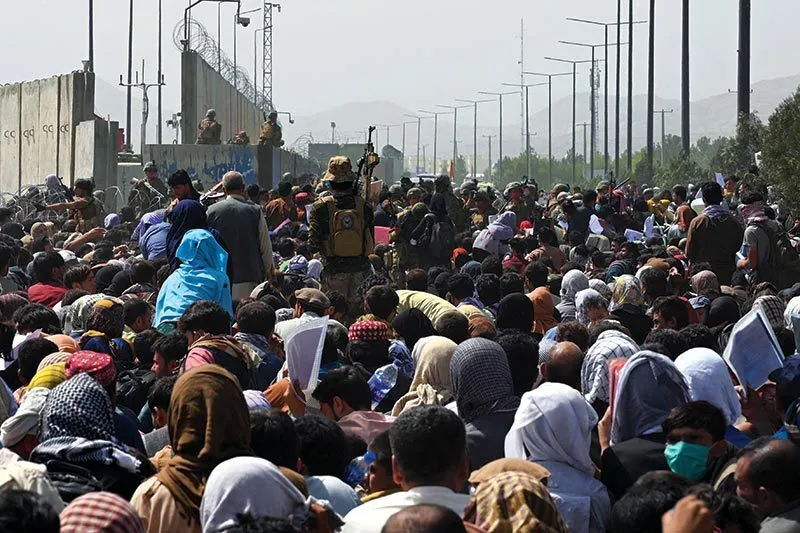
FUEL FOR NIGHTMARES
Two nights after the government’s collapse, a friend called to warn Hosseini that Taliban fighters were beginning house-to-house searches for enemies. The Hosseini family made a pile of its most dangerous possessions—English proficiency certificates, military training documents, school-related papers, Fatema’s carefree photos of herself and a mixed-gender group of friends in Western-style clothes. Some they tried to obliterate by burning in their bathroom (which smelled suspicious, they realized), and Masuma Hosseini spent hours cutting the rest into tiny pieces.
One document they did save was crucial for the future. Hosseini’s diploma from Asian Women’s University was tied securely to her back beneath her clothes and a traditional long cloak as she stared at the fortified perimeter of Kabul International Airport on Aug. 19 amid a raucous crowd of people wanting out as much as she did.
Over the previous days, a group had formed to help her, starting with colleagues at USA Today. The paper’s editor-in-chief, Nicole Carroll, says U.S.-based publications had become acutely aware of the risks their local staffs and freelancers faced, and wanted to create lifelines similar to those offered to Afghan nationals who worked for the American government.
“She’s a woman, a journalist, and she’d just published a story in the U.S. media critical of the Taliban,” Carroll says.
Kim Hjelmgaard, a London-based USA Today correspondent with whom Hosseini had worked on several stories, reached out to every contact he could think of, until a U.S. Navy reserve public affairs officer said he knew a Ukrainian army psychologist who was arranging air evacuations for Ukrainians and Ukrainian Afghans. There was a seat for Hosseini on the plane—if she could make it past multiple Taliban checkpoints at the airport.
At the first one, she’d already been separated from her younger brother, Abdulfazl, who was to help her through the tumult, when a young Taliban fighter slammed the butt of his rifle into her chest and threatened to kill her. She fell, and the youth came screaming toward her—“You could literally see in his eyes he was crazy, lashing people for no reason, shooting his gun in the air,” she says—before his older partner blocked him.
At the next, a Taliban soldier answered her confusion at following orders in the Pashto language by cracking his whip at her. It inadvertently struck the woman behind her and opened her shoulder bloodily. Again, Hosseini somehow slipped through.
She was nearly fainting under her layers in the 90-degree heat when she received a text from a Ukrainian special forces soldier who was waiting for her at a different gate. He wrote: “Sorry Fatema.” Certain the plane would leave in half an hour, she begged people to point her to the airport’s north gate, to no avail.
Fleeing back the way she came, she caught a taxi. As she approached the correct gate, she saw a vast crowd of men and women sitting together—“very religiously wrong,” she says, and a clear indicator of chaos. Taliban members fired Kalashnikovs while NATO forces shot containers of tear gas, one of which landed near her as she entered the crowd. Rapidly texting all of her contacts that she couldn’t catch her breath, she got a boost from Navy public affairs officer Alex Cornell du Houx. “Just let go of your tears, it’s OK. Just breathe,” he texted her.
Trapped in the reeling crowd, she sank down in the middle of a Pashtun family, and in front of his wife and daughter, a man inexplicably grabbed Hosseini forcefully and painfully between her legs. “His wife was watching that. He had a daughter who was watching that,” she says. “No one said anything.”
She struggled to her feet and screamed for help, even as a Taliban fighter threatened to shoot anyone who didn’t sit. Then he was next to her firing, shells falling inches from her ear.
“I don’t know if the woman by me died or not—I couldn’t look,” she says, struggling to relate the blur of horror. “Then he threw me like you throw a piece of trash, and I fainted.”
She awoke to an offer of much-needed water from a young man who called her “sister” and alerted her to her ringing mobile phone. With her brother approaching the gate, she decided to go home with him; her escape had failed. But then another message, this time from an Afghan working with Ukrainian forces, directing Hosseini to pass through one more gate. Blocked again by a black-clad fighter, she asked in desperation: “Why do you do this? We’re both Afghans. Why do you use this much violence?”
Without a word, the Taliban guard stepped aside, and moments later, as she yelled across a razor-wire fence that she had arrived, a Ukrainian soldier stepped through the perimeter, picked her up and carried her into the airport, where the plane still waited on the tarmac.
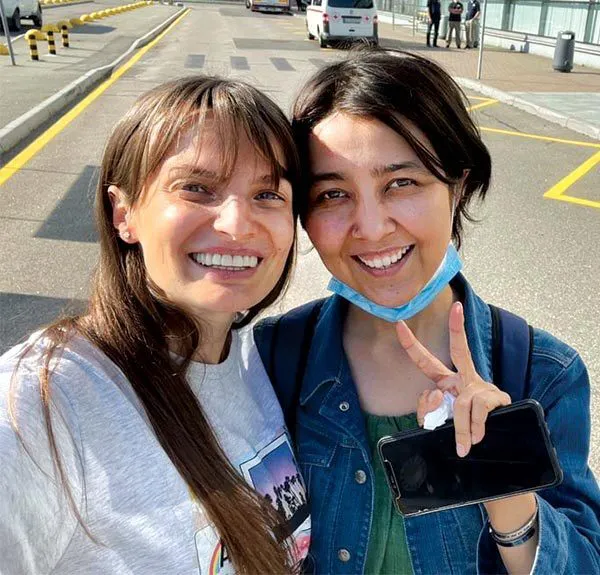
TEMPORARY REFUGE
She fled hatred and intolerance as her parents had done before her birth. Now she vowed to bring them and her siblings out as well.
Hosseini arrived in Kyiv, where now-retired Lt. Col. Iryna Andrukh, the Army psychologist who’d arranged for her seat on the plane, took Hosseini home with her.
“When I started texting with her, she seemed so sensitive and scared—just a tiny little girl who needed help,” Andrukh says. “I’m older than her, so I started feeling like her mom, and I took her to my parents’ apartment. Every day she was crying for her family, so I had to get them too.”
Andrukh, who had gained renown as a fearless hostage negotiator in Ukraine’s conflict with Russia, soon secured a Ukrainian plane and ferried hundreds more people out of Afghanistan—including Hosseini’s family.
They all reunited nearly two weeks later in Kyiv, and then, with help from Carroll and USA Today, she flew to Washington, where she planned to continue her education, arriving on Sept. 11. Her parents and siblings, meanwhile, waited for their Canadian refugee certification to join Marzia, who had moved to Vancouver after graduating from Montclair State University in New Jersey. (Their flight was not over, however. Still living in Kyiv when Russia launched an all-out invasion in February, they fled first to Poland before finally meeting Marzia in Canada.)
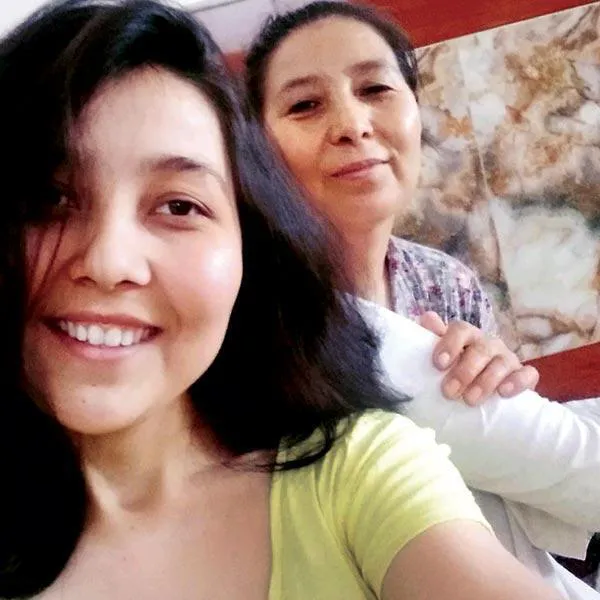
Carroll opened her home in Northern Virginia to Fatema, and helped her make connections around the Washington area, including with faculty at Merrill College, where Hosseini enrolled in January 2022.
Journalism Dean Lucy Dalglish says she’s grown used to walking past Knight Hall’s glass-walled classrooms and seeing Hosseini laser-focused on instruction, trying to absorb every bit of learning available, while she herself helps broaden the perspective of the college overall.
Hosseini’s future looks nearly limitless, Dalglish says.
“She can go back to her country and be a change-maker,” she says. “She could have a brilliant journalism career working for almost anybody. I think she has the potential to develop into a great leader.”
Hosseini relishes being just another student in the college, biking from an off-campus apartment, pursuing a piece for the Howard Center for Investigative Journalism or racing to finish a paper in the “News Bubble” lab. She is willing to talk about her struggles to honor the sacrifices of parents who helped keep her on a path to graduate studies, as well as the chain of people stretching from Kabul to College Park who helped her at great effort, simply because they were able.
Mostly, she wants the world to keep talking not only about Afghan refugees—including families welcomed in early 2022 to campus housing at UMD—but the plight of the vulnerable, particularly women and ethnic minorities, still suffocating under extremism and intolerance.
Safe for the moment, Hosseini is determined she’ll use the skills she’s now developing to tell the truth about her ongoing homeland and the slaughter of the Hazara people. “At first I was so angry, I wanted to join the army and fight,” she says. “I don’t think that anymore, but I am not done with the Taliban.”
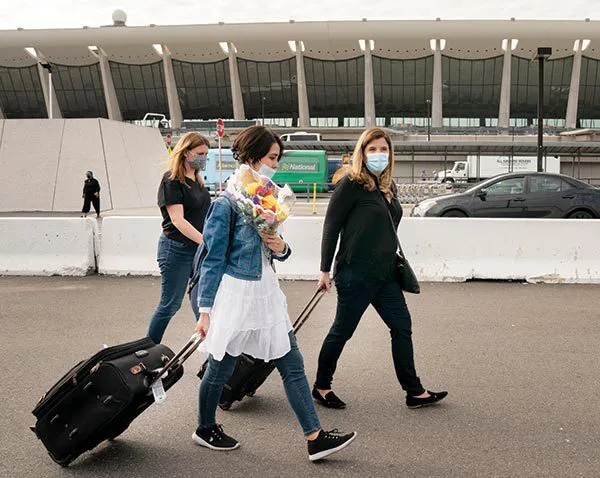
Thoughts of return mix with her disturbing dreams of escape. Hosseini remembers when her dreams seemed clear, even meaningful. In the final months of the Islamic Republic of Afghanistan, scattered groups of young people around Kabul talked of taking up arms to defend the city and whatever flowering of freedom they had experienced—wearing dresses, skateboarding, going to hip-hop shows—against the onrushing Taliban wave.
Hosseini was fascinated by the concept, both as a journalist and as a young Hazara woman, and she found herself one night in a dream walking into a large open space filled with ranks of muscular warrior women training, their long hair tied in loops and hung with assault rifles like deadly jewelry. She tried blending into a line of fighters, self-conscious of her lack of ability.
What should she do, she asked one of the warriors? How could she contribute?
“She looked at me, and she was, like, ‘You have a long way to go. You have to get prepared,’” Hosseini says. “Then I woke up in a sweat.”
This story is featured on the cover of the Winter 2023 issue of Terp magazine. Find all the stories online at terp.umd.edu.
